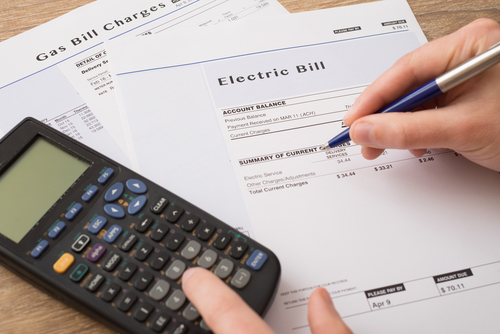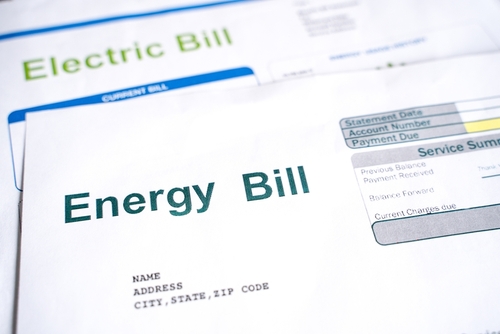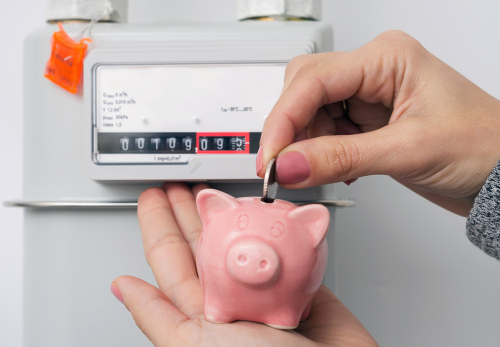One of the significant expenses of any household is utilities. After all, everyone needs water, heat, and electricity to live a comfortable life at home. However, adding up all the utility costs of a rental home can become quite overwhelming. As such, landlords and tenants should learn how to use less of these resources and save money on utilities each month. Today, we’ll go over which utilities tenants are responsible for and how to take small action steps to lower your monthly bills.

Contents of This Article:
- What Utilities Are Tenants Responsible For?
- How Much Do Utilities Cost in a Rental?
- Why Would You Want to Lower Utility Costs?
- How to Save Money on Utilities in Your Rental
- Ask the Professionals How to Save on Utilities
What Utilities Are Tenants Responsible For?
When it comes to who pays for utilities in a rental, it ultimately depends on the landlord’s lease agreement. For instance, sometimes landlords include utilities in the rent, so you pay one simple bill. Other times, tenants are responsible for paying utilities separately. As such, it’s important for rental property managers in Washington DC to inform tenants of their responsibilities.
Utilities in a rental home typically include water, electricity, heat, internet, trash collection, and potentially more, depending on the rental. However, internet and cable usually aren’t included, even if the landlord covers all main utilities. Ultimately, it’s best to ask your landlord or property manager to know which bills you’re responsible for.
That said, if you’re responsible for your rental utilities, you’ll want to correctly budget for them. Additionally, you have to set up the accounts with the utility companies to put them in your name. Now, if you’re wondering how much utilities typically cost and how much you’ll need to budget, just keep reading.
How Much Do Utilities Cost in a Rental?
The cost of utilities in a rental home can vary widely depending on several factors. For instance, it may differ depending on your location, size of the property, local costs of living, the energy efficiency of the property, and your usage habits. That said, here’s a general breakdown of the types of utilities you might encounter and their potential average costs.
- Electricity- Your electric bill will likely be your most expensive monthly bill. For instance, the average monthly electric bill for rental properties is around $115.

- Water- Water is another significant rental property expense. However, it’s typically not as expensive as electric costs. The average water bill for a rental home is around $45 to $50 monthly.
- Natural Gas- Gas bills can vary depending on what type of rental home you live in. For instance, if you live in a small one-bedroom apartment, your bill will likely be around $60 to $75. On the other hand, if you’re in a three-bedroom rental home, you can expect to pay around $115 or more.
- Internet and TV- Internet costs are usually around $60 to $75 per month. Additionally, many people pay for streaming services instead of cable, typically costing around $10 per month. For instance, a basic Netflix plan costs $7 per month.
- Trash and Recycling- Typically, landlords cover trash and recycling costs, but if it’s your responsibility, you can expect to pay around $10 each month, depending on where you live.
Why Would You Want to Lower Utility Costs?
There are several reasons to try and use less water, electricity, and heat in your rental property. Aside from the most obvious reason, which is to save money, there are also environmental benefits. For instance, lowering energy and water consumption contributes to a more sustainable lifestyle. By using fewer resources, you’re reducing your environmental impact and conserving valuable natural resources.
Energy production and consumption are major contributors to greenhouse gas emissions and environmental degradation. As such, by reducing your utility usage, you’re helping combat climate change and supporting a healthier planet. Not to mention, reduced utility bills mean more money in your pocket for other essential expenses or spending. Additionally, managing utility costs helps you maintain a more predictable and controllable budget, making it easer to plan for other financial goals.
How to Save Money on Utilities in Your Rental
Saving money on utilities in your rental home doesn’t have to be hard. You don’t have to live in discomfort or eliminate your everyday routine to save money on utilities. All it takes is a money-saving mindset and small daily actions. That said, here are some simple, actionable steps that can help you save money on utilities in your home.
Lowering Electric Costs
- Unplug Devices- Unplug chargers, electronics, and appliances to prevent “phantom” energy consumption when not in use.
- LED Lighting- Replace traditional incandescent light bulbs with energy-efficient LED bulbs, which consume less electricity and have a longer lifespan.
- Natural Light- Utilize natural light during the day to reduce the need for artificial lighting.
- Energy-Efficient Appliances- If possible, choose energy-efficient appliances with the Energy Star label, as they use less energy.

- Use Fans Wisely- Use ceiling fans to circulate air in a room, making you feel comfortable without overusing air conditioning.
How to Save Money on Heating and Cooling
- Thermostat Settings- Adjust your thermostat setting seasonally. During colder months, lower the thermostat when you’re not at home or when you’re sleeping. In warmer months, raise it when you’re away.
- Seal Drafts- Use weather stripping and draft stoppers to seal gaps around windows and doors to prevent cold or warm air from escaping.
- Air Conditioning Maintenance- Regularly clean or replace air filters to ensure your air conditioning system operates efficiently.
- Window Treatments- Use curtains, blinds, or window films to block out heat in summer and keep warmth during winter.
- Natural Ventilation- Open windows during cool evenings to let in fresh air and reduce the need for air conditioning.
Saving Money on Water
- Fix Leaks- Promptly repair any leaky faucets or pipes to prevent slowly wasting water throughout the day.
- Water-Saving Devices- Install low-flow showerheads and faucets to reduce water consumption while maintaining water pressure. You can usually buy these at your local hardware store.
- Full-Loads- Only run the dishwasher and washing machine when you have full loads to maximize water efficiency.
- Shorter Showers- Consider setting a timer when you shower and attempt to shorten them from your usual time. Shorter showers mean less water wasted and a lower water bill.
How to Save on Cable and Internet Bills
- Bundle Services- For potential cost savings, consider bundling cable, internet, and phone services from the same provider.
- Negotiate- Regularly check with your provider for promotions or discounts, and don’t hesitate to negotiate a better rate.
- Streaming Services- Consider switching to streaming services that offer more flexible and affordable options than traditional cable.
- Downgrade Plans- Evaluate your usage patterns and downgrade to a lower-tier plan if you’re paying for more than you need.
Ask the Professionals How to Save on Utilities
If you want to save money on utilities, you’ll want to evaluate what you pay for and how much you typically use each month. Then, you can implement small changes to your everyday life to potentially lower your monthly bills. If you need help determining what bills you’re responsible for or want to learn more ways to save, ask your landlord or property managers!
Need More Advice? contact us today!
Bay Property Management Group offers comprehensive rental management services throughout Baltimore, Philadelphia, Northern Virginia, and Washington, DC. So, if you own rental properties and need help finding tenants, marketing properties, or performing maintenance, contact BMG today!
